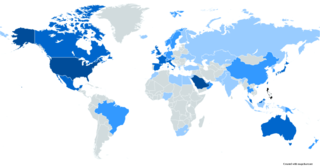Asian Nigerians are Nigerian citizens whose ancestry lies within the continent of Asia, most notably Bangladesh, Lebanon, China, Hong Kong, Philippines, Pakistan, Singapore, Sri Lanka, South Korea, Indonesia, Malaysia, Taiwan, Thailand, Vietnam, India and Japan. It also refers to Asian-born persons currently living in Nigeria. By mid-2008, Filipino residents in the country had increased to an estimated 4,500, up from 3,790 in December 2005.[ citation needed ] There is a large population of Chinese people in Nigeria which comprise Chinese expatriates and descendants born in Nigeria with Chinese ancestry. As at 2012, there are approximately 20,000 Chinese in Nigeria. [1] [2]
In 1930, colonial Nigeria's census showed four Chinese immigrants residing there. Hong Kong investors started opening factories in Nigeria as early as the 1950s. By 1965 there were perhaps 200 Chinese people in the country. By 1999, that number had grown to 5,800, including 630 from Taiwan and 1,050 from Hong Kong. [3] Filipinos arrived in Nigeria as early as the 1970s; the Philippine Barangay Society of Nigeria was founded in 1973 in an effort to coordinate the various Philippine community organisations that had already sprouted up around the country. [4] [5]

The Philippines, officially the Republic of the Philippines, is an archipelagic country in Southeast Asia. It is situated in the western Pacific Ocean and consists of around 7,641 islands that are broadly categorized under three main geographical divisions from north to south: Luzon, Visayas, and Mindanao. The Philippines is bounded by the South China Sea to the west, the Philippine Sea to the east, and the Celebes Sea to the southwest. It shares maritime borders with Taiwan to the north, Japan to the northeast, Palau to the east and southeast, Indonesia to the south, Malaysia to the southwest, Vietnam to the west, and China to the northwest. The Philippines covers an area of 300,000 km2 (120,000 sq mi) and, as of 2021, it had a population of around 109 million people, making it the world's thirteenth-most populous country. The Philippines has diverse ethnicities and cultures throughout its islands. Manila is the country's capital, while the largest city is Quezon City; both lie within the urban area of Metro Manila.

Maria Lea Carmen Imutan Salonga,, is a Filipina singer and actress, best known for her roles in musical theatre, for supplying the singing voices of two Disney Princesses, and as a recording artist and television performer.

Chinese Filipinos are Filipinos of Chinese descent, mostly of Hokkien ancestry, where the majority are born and raised in the Philippines. Chinese Filipinos are one of the largest overseas Chinese communities in Southeast Asia. Chinese immigration to the Philippines occurred mostly during the Spanish colonization of the islands between the 16th and 19th centuries, attracted by the lucrative trade of the Manila galleons and since the late 20th century. In 2013, according to the Senate of the Philippines, there were approximately 1.35 million ethnic Chinese within the Philippine population, while Filipinos with any Chinese descent comprised 22.8 million of the population. However, the actual current figures are not known since the Philippine census does not usually take into account questions about ethnicity.

An overseas Filipino is a person of full or partial Filipino origin—i.e., people who trace back their ancestry to the Philippines but living or residing outside the country. This term generally applies to both people of Filipino ancestry and citizens abroad. As of 2019, there were over 12 million Filipinos overseas.

Filipinos are the people who are citizens of or native to the Philippines. The majority of Filipinos today come from various Austronesian ethnolinguistic groups, all typically speaking either Filipino, English and/or other Philippine languages. Currently, there are more than 185 ethnolinguistic groups in the Philippines; each with its own language, identity, culture and history.

The Philippines is inhabited by more than 182 ethnolinguistic groups, many of which are classified as "Indigenous Peoples" under the country's Indigenous Peoples' Rights Act of 1997. Traditionally-Muslim peoples from the southernmost island group of Mindanao are usually categorized together as Moro peoples, whether they are classified as Indigenous peoples or not. About 142 are classified as non-Muslim Indigenous People groups, and about 19 ethnolinguistic groups are classified as neither indigenous nor moro. Various migrant groups have also had a significant presence throughout the country's history.
Indonesians in the Philippines consist of expatriates and immigrants from Indonesia residing in the Philippines, and their descendants. Among them were many formerly stateless people, legally called Persons of Indonesian descent (PID), whom the United Nations and the governments of the two countries helped to acquire citizenship.
Koreans in the Philippines, largely consisting of expatriates from South Korea and people born in the Philippines with Korean ancestry, form the largest Korean diaspora community in Southeast Asia and the ninth-largest in the world, after Koreans in Kazakhstan and before Koreans in Vietnam. As of 2013, statistics of South Korea's Ministry of Foreign Affairs and Trade recorded their population at 88,102 people, a fall of 31% since 2009 after a period of rapid growth in the population in the preceding decade.

The 2006 Hengchun earthquakes occurred on December 26 at 20:26 and 20:34 local time off the southwest coast of Taiwan in the Luzon Strait, which connects the South China Sea with the Philippine Sea. The International Seismological Centre measured the shocks at 7.0 and 6.9 on the moment magnitude scale. The earthquakes not only caused casualties and building damage, but several submarine communications cables were cut, disrupting telecommunication services in various parts of Asia.
Immigration to the Philippines is the process by which people migrate to the Philippines to reside in the country. Many, but not all, become citizens of the Philippines.

Eugena Roxas Domingo, popularly known as Eugene Domingo, is a Filipino actress, comedienne and host. She has performed in lead and supporting roles in various genres of the Philippine film industry. She is popularly known as the "Comedy Star for All Seasons" and was a sidekick of the Philippines' "Comedy Concert Queen", Ai-Ai delas Alas, in the Ang Tanging Ina series (2003–2010), until her very first lead film role in Kimmy Dora in 2009.
Filipinos in Nigeria consist largely of migrant workers in the oil industry, though those in the capital city Abuja also work in the education and medical sectors. By mid-2008, their numbers had grown to an estimated 4,500, up from 3,790 in December 2005. They commonly hold skilled construction positions, among them pipe layers, welders, and engineers, and may earn as much as US$10,000 per month; however, they often find themselves the target of violence by local militants.
CTBC Bank is amongst the largest privately owned banks in Taiwan.

Tan Yu was a Chinese-Filipino philanthropist and businessman who founded the Asiaworld Internationale Group and established the KTTI Foundation, which provided scholarships to and supported the education of thousands of young students. In 1997, Forbes listed Tan Yu as the 7th wealthiest person in the world, estimating his net worth to be about $7 billion. He was placed amongst the top 10 in the world on the Forbes List of World Billionaires 1997, making him wealthiest man in the Philippines.

Typhoon Ketsana, known in the Philippines as Tropical Storm Ondoy, was the second-most devastating tropical cyclone of the 2009 Pacific typhoon season, causing $1.15 billion in damages and 921 fatalities, only behind Morakot earlier in the season, which caused 789 deaths and damages worth $6.2 billion. Ketsana was the sixteenth tropical storm, and the eighth typhoon of the season. It was the most devastating tropical cyclone to hit Manila, surpassing Typhoon Patsy (Yoling) in 1970.

The Manila hostage crisis, officially known as the Rizal Park hostage-taking incident, took place when a disgruntled former Philippine National Police officer named Rolando Mendoza hijacked a tourist bus in Rizal Park, Manila, Philippines, on August 23, 2010. The bus carried 25 people: 20 tourists, a tour guide from Hong Kong, and four local Filipinos. Mendoza claimed that he had been unfairly dismissed from his job, and demanded a fair hearing to defend himself.
There is a large population of Chinese people in Nigeria which can include Chinese expatriates and descendants born in Nigeria with Hakka ancestry.
The Scarborough Shoal standoff refers to the tensions between the Republic of the Philippines and the People's Republic of China over the disputed Scarborough Shoal. Tensions began on April 8, 2012, after the attempted apprehension of the Philippine Navy of eight mainland Chinese fishing vessels near the shoal.

Anti-Filipino sentiment refers to the general dislike or hatred towards the Philippines, Filipinos or Filipino culture. This can come in the form of direct slurs or persecution, in the form of connoted microaggressions, or depictions of the Philippines or the Filipino people as being inferior in some form psychologically, culturally or physically.

Philippines–Taiwanese relations, also retroactively known as ROC-Philippine relations are foreign relations between the Republic of the Philippines and Republic of China (Taiwan). The Philippines maintains relations with Taiwan through the Manila Economic and Cultural Office in Taipei and Taipei Economic and Cultural Office in Manila.